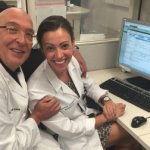When the Foundation launched this initiative, it sought to find “the best, most innovative projects and give them enough funding to move … to the next level,” Dr. Karp adds. Grant applicants included researchers outside of rheumatology and those new to RA research. “Of our 101 funded investigators, 87 have gone on to secure [a total of] $187 million in NIH funding. They have published 200 articles and delivered over 300 presentations on their Rheumatology Research Foundation–funded work,” says Dr. Karp.
One of the investigators presenting his findings at the meeting, Michael Holers, MD, says this extraordinarily important program will help rheumatologists discover new ways to treat their RA patients.
“Support from the Foundation has been critical to those of us who are interested in figuring out how rheumatoid arthritis starts in individuals who demonstrate highly related antibodies, but who are initially asymptomatic for several years prior to subsequently developing pain and swelling,” says Dr. Holers, a rheumatologist at the University of Colorado, Denver. “In this area of exploratory high-risk, high-reward research, continued support of the Foundation has the real potential to lead to prevention of the development of this disease.”
The exciting results of the Dallas investigators meeting highlight the importance of the Foundation’s continuing support for its disease-targeted research efforts, says Dr. Daikh. Unearthing the causes of rheumatic diseases, developing new treatments, and possibly finding a cure for these patients will only come from long-term commitment to fundamental research and training, he says.
“A strong academic research community has been the backbone of rheumatology training programs across the country. The ongoing work and survival of a strong research community is absolutely vital to ensure future discoveries and to the ongoing health of rheumatology training programs,” says Dr. Daikh. “Support of these investigators through the funds given to the Foundation is of great importance to patients and to the rheumatology community as a whole.”
For more information on the Rheumatology Research Foundation or to learn more about the Disease Targeted Research program, please call (404) 633-3777 or visit www.rheumatology.org/foundation.


